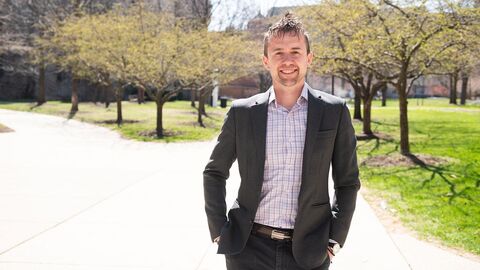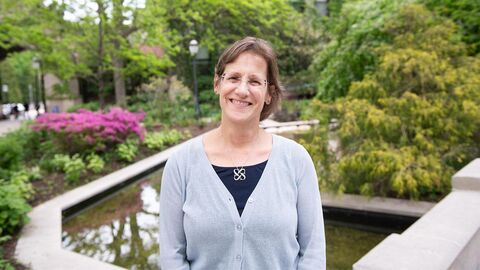Three UChicago Biosciences faculty were recently recognized for their incredible teaching and mentoring.
Dr. Kay Macleod (Cancer Biology, Metabolism) and Dr. Bryan Dickinson (Chemistry, Cancer Biology) were recognized for Excellence in Ph.D. Teaching and Mentoring:
Kay Macleod says that it can be a challenge balancing the demands of teaching with managing an active research lab, but one of the biggest benefits of doing both is that each activity feeds the other.
“I'll always get asked questions in class that surprise me, and that make me re-evaluate the impact or importance of a particular aspect of research,” she said. “But what's also important the other way around is, if you're not deeply in the research, you're not going to be keeping the educational content of your classes up to date. It's so important to stay current as we seek to inspire the next generation.”
One of the main reasons Macleod says it’s important to stay current is because the students themselves are changing along with the subject matter. Macleod took the helm of a graduate training program in cancer biology, supported by a T32 grant from the National Cancer Institute, in 2013. Since then, she says graduate students are much more likely to be pursuing basic science careers beyond academia, whether that be in the pharmaceutical industry or in government service.
In response, she has added classes that focus on translating discoveries in the lab to clinical applications and treatments for patients. This includes guest lectures by instructors from the Chicago Booth School of Business and the Polsky Center for Entrepreneurship and Innovation on how to pitch ideas to venture capitalists or find collaborative partners elsewhere in industry.
“We’re training these students to think about the clinical and translational relevance of their own research project, where they take their own graduate research project and push it to the next level, whether that be a new diagnostic or therapeutic or even a new computational algorithm for quantifying data more rapidly and effectively as we see in AI approaches” Macleod said.
Despite the changing focus of students over the years, however, some things always stay the same. “They're all driven by the passion for scientific discovery and the excitement of new data they just got from a cool experiment. Watching that transition in a grad student as they become independent researchers is something I always find very rewarding,” she said.

Bryan Dickinson noted that when grad students enter his lab, they aren’t learning to one day be scientists, he says: they are already scientists.
“From day one, we’re going to pick some important science to do and you’re going to spend years figuring out how to do it, and you’ll learn from going through that journey,” says Dickinson. “The only way to become a scientist is to do science, and the more you do, the more you will get the intuition and approach that makes you a good scientist.”
In Dickinson’s lab, students and postdocs blend chemistry, biology, and engineering to create new technologies for health and medicine—an unusual approach that Dickinson describes as a “chaotic soup of science.”
It’s deliberate because Dickinson wants students to choose a problem they care about and then go after it, regardless of prior expertise.
“For Bryan, it's so important that we feel ownership over our work. He wants every person in a group to feel like we are pursuing our own ideas, as opposed to working on a project cooked up by him or someone else,” a nominator wrote.
The members of his lab are encouraged to be creative and try risky ideas—knowing that many or even most experiments fail. But this approach works because Dickinson is deliberate about building an environment where failures are normal, expected, and supported.
He checks in with each student frequently, offering guidance and a ready ear; a former student wrote, “His ability to motivate, uplift, and instill confidence in his students is one of his greatest strengths—a skill I now seek to emulate in my own mentoring.”
But he also encourages other members of his lab to do the same with each other. Another nominator wrote: “His energetic, encouraging attitude permeates the lab. My labmates constantly share questions, suggestions, and excitement over each other’s projects. Science is hard, so doing it alongside genuine cheerleaders makes a huge difference.”
“For me, this is really an award for the culture that me and my group have built together,” Dickinson said.

Additionally, Dr. Cathy Pfister (Ecology and Evolution, Evolutionary Biology) received the Llewellyn John and Harriet Manchester Quantrell Award for excellence in undergraduate teaching, The Quantrell award is believed to be the nation's oldest prize for undergraduate teaching. Pfister stressed the importance of hands-on learning and the process of learning about evaluating evidence for College students. “The undergraduates at the University of Chicago are a very motivated and motivating group of students,” Pfister explained. “I enjoy talking with them, I enjoy challenging them, and I enjoy seeing the questions they bring to me. More than once, their questions have made me think of things in a new light.”